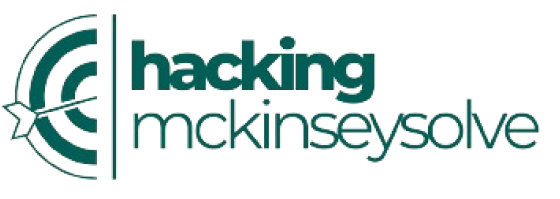The prestigious consulting firm McKinsey & Company uses the McKinsey Problem-Solving Game (PSG) as a key component of their hiring procedure. Many people have questioned whether McKinsey invites every applicant to participate in the problem-solving game because it is one of the deciding aspects of the selection process.
This post will offer some clarification on the controversy of whether the Solve game is available to all McKinsey candidates, as well as some background information about the game.
Is the McKinsey problem-solving game open to everyone?
Not everyone will be asked to play the McKinsey Solve game. The invitation is dependent on a number of elements, such as academic record, professional experience, and, occasionally, recruiting networks.
The first criteria used to determine whether or not a candidate is invited to the PSG is often their academic and professional experiences. Students who excel academically and personnel who can produce remarkable results for their companies are both valued by McKinsey.
Therefore, the greatest way to present your profile would be to write a CV or resume that is results-oriented. For instance, while talking about your academic credentials, emphasize your GPA. Large consulting companies like McKinsey constantly seek out applicants with a GPA of 3.6 or higher. If your GPA isn’t as high, you can still impress McKinsey recruiters with extracurricular activities associated with well-known companies or other credentials (such as excellent SAT/GMAT scores or an MBA degree).

Likewise, if you have off-field experience, highlight your accomplishments with specific outcomes. Instead of saying, “I am good at making money,” say, “I was able to strike a deal with the A company, which boosted the company’s profit by X% and exceeded the planned target by X%.” You must be regarded as an effective worker who is motivated by results and capable of becoming successful.
In some circumstances, the invitation may be impacted by the recruiting windows. For instance, prior to the screening stages in 2021, all INSEAD applicants were given access to the McKinsey PSG. These situations don’t often happen, though.
Who is exempt from the McKinsey game?
Candidates with professional expertise might not need to take the McKinsey PSG. There have been cases of professionals with exceptional profiles being welcomed by the company without passing the PSG. These situations are uncommon, though, as the game becomes more compulsory.
As a result, declining an invitation to the game does not automatically rule out later opportunities. You may be qualified enough based on your profile to forego the McKinsey PSG.
In some circumstances, the invitation may be impacted by the recruiting windows. For instance, prior to the screening stages in 2021, all INSEAD applicants were given access to the McKinsey PSG. These situations don’t often happen, though.

What should you do if you receive a McKinsey Solve game invitation?
Study the game formats
There are six minigames in the McKinsey PSG. Candidates must perform tasks with an environmental protection motif in either underwater or mountainous ecosystems.
- Ecosystem Building
- Plant Defense
- Disease Management
- Disaster Management
- Migration Management
- Redrock Study (released 2022)
You only need to participate in two of the six minigames that McKinsey has created. Most applicants will receive one of two minigames called “Ecosystem Building” or “Plant Defense,” while the remaining applicants will be randomly assigned one of four additional, rarer games.
Strategize before playing the PSG
Practice with PSG simulations is one of the quickest ways to develop tactics for the McKinsey problem-solving game. These tools are fantastic since they can assist you in studying the game and identifying patterns upon which to base your plans. Additionally, they can help you better understand your strengths and weaknesses when processing and evaluating data, allowing you to improve.
You would be more likely to save time in the real PSG and get the best score once you have created techniques for each game type. Additionally, demonstrating your logical thinking process to recruiters through a creative approach is just as important as getting good results. After all, the McKinsey Solve game is intended to gauge candidates’ cognitive abilities and analyze processes.
